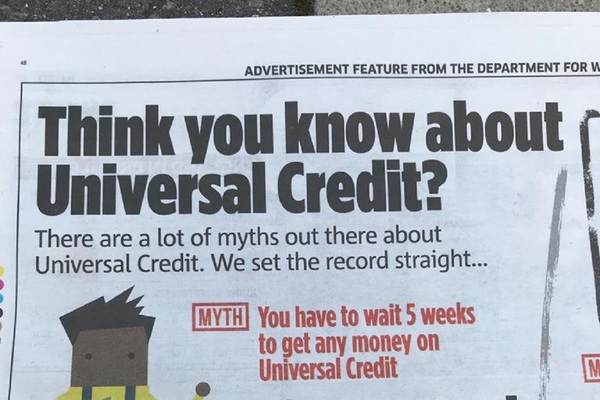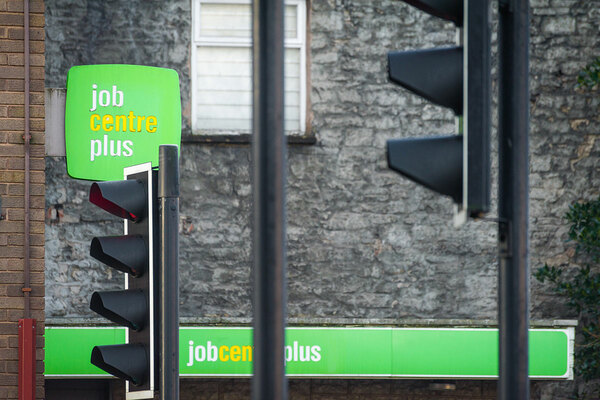You are viewing 1 of your 1 free articles
Watchdog bans government’s Universal Credit adverts for being ‘misleading’
Government newspaper adverts about Universal Credit were misleading, the advertising watchdog has ruled.
The Advertising Standards Authority (ASA) has upheld a complaint first lodged by anti-poverty charity Zacchaeus 2000 Trust (Z2K) about a nine-week campaign launched in the Metro and Mail Online in May by the Department for Work and Pensions (DWP).
It has demanded that the adverts not appear again in the same form and told the DWP “to ensure that they held adequate evidence to substantiate the claims in their advertising, to include significant conditions and to present significant conditions clearly”.
The campaign, titled “Universal Credit Uncovered”, ostensibly sought to “set the record straight” about the six-in-one benefit system.
Adverts included statements such as: “MYTH: Universal Credit makes it harder to pay your rent on time. FACT: Your Jobcentre can give you an advance payment and pay rent directly to landlords.”
They also rejected “myths” that claimants must wait five weeks to receive money on Universal Credit and that it “doesn’t work” and featured positive case studies about people’s experiences of using the system.
But the ASA said each of these three assertions were misleading.
It concluded that as only 11% of Universal Credit claimants have their rent paid direct to landlords and not all are eligible, the statement about this claim “misleadingly implied that under Universal Credit the option to have rent paid directly to landlords was generally available”.
The ASA also said the adverts’ claim that “people move into work faster on Universal Credit” was not substantiated because it “did not accurately reflect the evidence”.
On the five-week wait point, the ASA said the ads breached its rules because the claim that “if you need money, your Jobcentre will urgently pay you an advance” was also not backed by evidence as claimants “must generally wait five weeks to receive their first payment”.
Forty-four complaints about the campaign were submitted to the ASA, including by Z2K, the
Motor Neurone Disease Association, and the Disability Benefits Consortium.
Z2K argued that the articles were “propagandist” and challenged “facts” they put forward about Universal Credit, as well as raising concerns that they were not clearly displayed as being produced by the DWP.
The articles did not include DWP branding but stated “advertising feature from the Department for Work and Pensions” in the page header.
The ASA agreed with the DWP and Metro publisher Associated Newspapers Ltd that the print ads were “obviously identifiable as marketing communications”, but said this was not the case for online versions because the label was not prominent enough.
Raji Hunjan, chief executive of Z2K said: “This is a huge win for the tens of thousands of ordinary people who are suffering as a result of a broken benefits system and whose voices have been ignored by policy-makers for far too long.
“This damning judgement against the DWP, which finds it guilty of ‘misleading advertising’, ‘exaggeration’ and its failure to substantiate and qualify its claims, reveals an attitude which is not acceptable in public service, especially in the department charged with protecting people from living in poverty.”
Z2K is calling for an investigation into how the adverts were approved and for the DWP to apologise.
A spokesperson for the DWP said: “We are disappointed with this decision and have responded to the Advertising Standards Authority.
“We consulted at length with the ASA as we created the adverts, which have explained to hundreds of thousands of people how Universal Credit is helping more than 2.5 million people across the country.”













